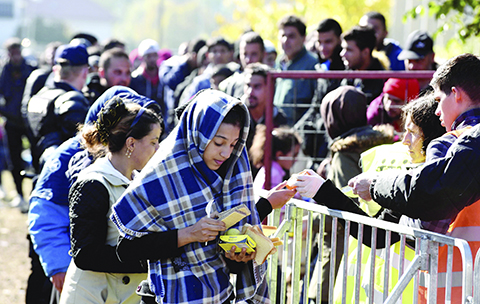It is an indication of the divisions that have opened up between European Union states over how to deal with an influx of hundreds of thousands of migrants, many fleeing conflict in Syria, Iraq and Afghanistan. "The three countries, we are standing ready, if Germany and Austria close their borders, not to allow our countries to become buffer zones. We will be ready to close borders," Borisov told reporters.
"We will not expose our countries to the devastating pressure of millions that would come." Romanian Prime Minister Victor Ponta said this would be the three countries' common position at an extraordinary meeting of some European leaders on Sunday to tackle the migrant crisis in the western Balkans. Thousands trying to reach Germany are already trapped there in deteriorating conditions.
"We carry out our obligations, we are in solidarity with all of Europe," Ponta said. "But the responsibility cannot be put with just some countries. "If there are countries which close their borders, or build fences, then we have the right to defend ourselves in a timely manner." Romania's neighbor Hungary has built a fence to keep out migrants and closed its border with Croatia, prompting Slovenia to consider following suit with its own fence.
European Commission chief Jean-Claude Juncker has invited to Sunday's mini-summit the heads of state or government of Austria, Bulgaria, Croatia, Macedonia, Germany, Greece, Hungary, Romania, Serbia and Slovenia, plus key organizations involved. The aim of the meeting is to agree "common operational conclusions which could be immediately implemented".
It comes as crowds of refugees and other migrants camp by roads in western Balkan countries in worsening autumn weather after Hungary sealed its borders, causing a chain reaction in other overwhelmed states. "It is important for the people to know that it is not a problem to register (refugees), or build bigger centres, nothing of this is a problem for Serbia," Serbian Prime Minister Aleksandar Vucic told reporters.
Inflow continues
A huge inflow of migrants and refugees to Slovenia continued yesterday as thousands of people arrived to the tiny Alpine state on their way to Austria and Germany. Since last Saturday 58,000 migrants, many fleeing the war in Syria, have arrived in Slovenia, shifting their route to the west after Hungary sealed off its borders. As a percentage of Slovenia's tiny population that is the equivalent of almost 2.3 million people entering Germany or 1.8 million arriving in Britain in a week. Police said about 9,000 migrants were still in Slovenia yesterday with more on the way.
"We want to go to the Netherlands. I just want this ordeal to stop. There is no way back and I am ready to do anything to secure a future to my son," said 20-year-old Hamrein from Syria, holding her feverish 6-month-old son against her chest. She was one of about 2,000 migrants who were waiting in a muddy field near the Slovenian village of Rigonce to cross to nearby migrant camp, braving cold and foggy weather. Many put up fires and wrapped themselves into blankets and aluminium foil to try to keep warm with morning temperatures being close to zero.
They hope to be able to reach Austria later on Saturday but many more are behind them with about 8,500 migrants entering Serbia over the past 24 hour in order to continue their way to Croatia, Slovenia and then Austria. Serbia, Bulgaria and Romania said yesterday they would close their borders if Germany would do so, so as to prevent the Balkans becoming a buffer zone for stranded migrants.
Slovenia had said on Friday it would consider putting up a fence on its border with Croatia unless a solution is found at a today's meeting of regional heads of states with European Commission President Jean-Claude Juncker. Croatia has so far insisted that walls or fences are not the solution, but rather a common EU approach tackling the situation on the border between Greece and Turkey, where most migrants and refugees enter the EU. - Agencies



